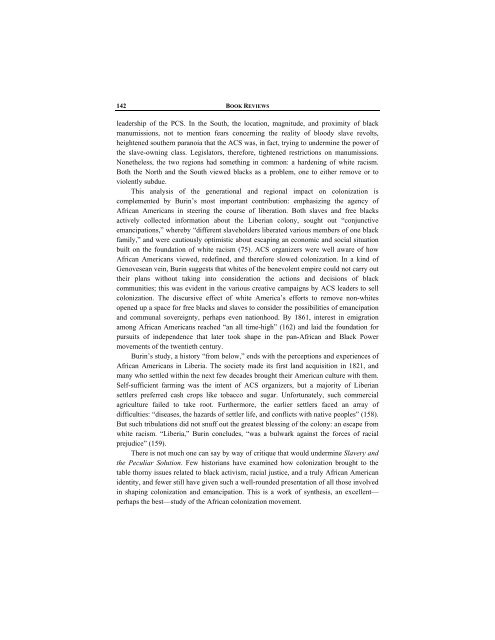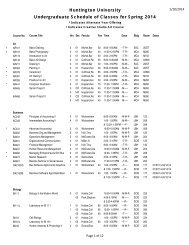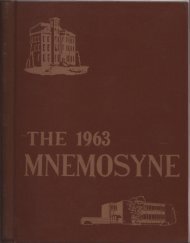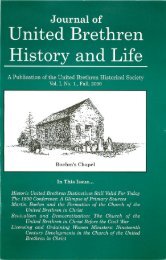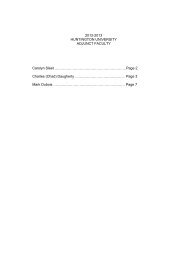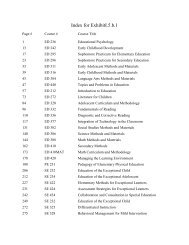Gillian Clark, Christianity and Roman Society - Huntington University
Gillian Clark, Christianity and Roman Society - Huntington University
Gillian Clark, Christianity and Roman Society - Huntington University
You also want an ePaper? Increase the reach of your titles
YUMPU automatically turns print PDFs into web optimized ePapers that Google loves.
142 BOOK REVIEWS<br />
leadership of the PCS. In the South, the location, magnitude, <strong>and</strong> proximity of black<br />
manumissions, not to mention fears concerning the reality of bloody slave revolts,<br />
heightened southern paranoia that the ACS was, in fact, trying to undermine the power of<br />
the slave-owning class. Legislators, therefore, tightened restrictions on manumissions.<br />
Nonetheless, the two regions had something in common: a hardening of white racism.<br />
Both the North <strong>and</strong> the South viewed blacks as a problem, one to either remove or to<br />
violently subdue.<br />
This analysis of the generational <strong>and</strong> regional impact on colonization is<br />
complemented by Burin’s most important contribution: emphasizing the agency of<br />
African Americans in steering the course of liberation. Both slaves <strong>and</strong> free blacks<br />
actively collected information about the Liberian colony, sought out “conjunctive<br />
emancipations,” whereby “different slaveholders liberated various members of one black<br />
family,” <strong>and</strong> were cautiously optimistic about escaping an economic <strong>and</strong> social situation<br />
built on the foundation of white racism (75). ACS organizers were well aware of how<br />
African Americans viewed, redefined, <strong>and</strong> therefore slowed colonization. In a kind of<br />
Genovesean vein, Burin suggests that whites of the benevolent empire could not carry out<br />
their plans without taking into consideration the actions <strong>and</strong> decisions of black<br />
communities; this was evident in the various creative campaigns by ACS leaders to sell<br />
colonization. The discursive effect of white America’s efforts to remove non-whites<br />
opened up a space for free blacks <strong>and</strong> slaves to consider the possibilities of emancipation<br />
<strong>and</strong> communal sovereignty, perhaps even nationhood. By 1861, interest in emigration<br />
among African Americans reached “an all time-high” (162) <strong>and</strong> laid the foundation for<br />
pursuits of independence that later took shape in the pan-African <strong>and</strong> Black Power<br />
movements of the twentieth century.<br />
Burin’s study, a history “from below,” ends with the perceptions <strong>and</strong> experiences of<br />
African Americans in Liberia. The society made its first l<strong>and</strong> acquisition in 1821, <strong>and</strong><br />
many who settled within the next few decades brought their American culture with them.<br />
Self-sufficient farming was the intent of ACS organizers, but a majority of Liberian<br />
settlers preferred cash crops like tobacco <strong>and</strong> sugar. Unfortunately, such commercial<br />
agriculture failed to take root. Furthermore, the earlier settlers faced an array of<br />
difficulties: “diseases, the hazards of settler life, <strong>and</strong> conflicts with native peoples” (158).<br />
But such tribulations did not snuff out the greatest blessing of the colony: an escape from<br />
white racism. “Liberia,” Burin concludes, “was a bulwark against the forces of racial<br />
prejudice” (159).<br />
There is not much one can say by way of critique that would undermine Slavery <strong>and</strong><br />
the Peculiar Solution. Few historians have examined how colonization brought to the<br />
table thorny issues related to black activism, racial justice, <strong>and</strong> a truly African American<br />
identity, <strong>and</strong> fewer still have given such a well-rounded presentation of all those involved<br />
in shaping colonization <strong>and</strong> emancipation. This is a work of synthesis, an excellent—<br />
perhaps the best—study of the African colonization movement.


